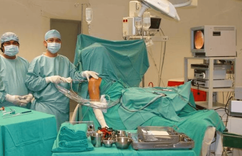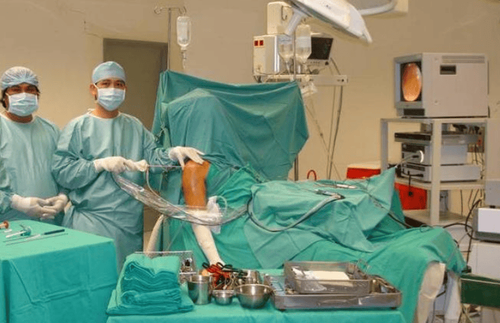Mr. V. (of German descent) visited Vinmec International General Hospital after experiencing chest pain. He underwent an assessment and was found to have heart failure, which required urgent surgery. Working in Shanghai and traveling to Vietnam for business, Mr. V. felt confident that he could schedule an appointment for treatment after learning that the surgeon was Dr. Nguyen Hoang Ha, a skilled thoracic surgeon on the Vinmec side.
Mr. V., a 55-year-old man with a history of smoking and weight gain, claimed that he was implanted despite having heart disease, significant calcified aortic valve stenosis, and left subclavian artery stenosis. stent for the left femoral artery. Even though he had suggested replacing the aortic valve, he postponed it since he couldn't organize the necessary labor. When he went to Vinmec, the results of the tests, particularly the coronary angiography, revealed that Mr. V had heart failure and required immediate surgery because failure of the heart may be fatal. He carefully researched the capabilities of cardiovascular surgery at Vinmec, the state of the facilities, and even consulted with family members in Vietnam and foreign medical professionals working in Vietnam before deciding to undergo surgery at the hospital.
Thoracic surgeon Dr. Nguyen Hoang Ha is an expert at Vinmec
It is challenging to operate on the patient since this is an uncommon instance of the Rh (-) blood group. Vinmec has produced reserve blood with the help of the National Institute of Hematology and Blood Transfusion so that it can be quickly administered to patients. Vinmec had a parallel approach, though, which was to use the complete blood transfusion technique in order to reduce any hazards that the patient would have when receiving a blood transfusion. During surgery, all of the patient's blood that bleeds is collected, cleaned using a cell saver, and then securely given back to the patient.As a result, the hospital's blood preparation amount need not be used, nor does the patient need to have a transfusion of "foreign" blood.
Mr. V underwent a procedure to replace his mechanical aortic valve. Additionally, doctors have stated that patients must take anticoagulants permanently. Mr. V. was released in good health on January 15 following two weeks of recovery in accordance with Vinmec's exclusive program for heart surgery patients.
Dr. Hoang Ha continued, "Blood loss is inevitable in general surgery, particularly cardiovascular surgery, and the patient needs to get the lost blood again. Even when the blood has been checked, there is still a chance that the patient could be at danger when receiving blood from another individual. The body will respond, causing hemolysis, when immune hemolytic disease patients get transfusions of someone else's blood. The return transfusion method is the best choice in that situation or for the bleeding emergency patient. Blood is typically cleansed and re-transfused to the patient's body after cardiovascular surgery. In some operations, up to 70–80% of the blood loss can be restored to the patient with quality blood.
As a result, Dr. Ha stated that the Department of Cardiology has utilized this strategy in the past with great success. That is another reason why many patients select the Department of Cardiology at Vinmec International General Hospital because they are so happy with the procedure and level of quality of cardiovascular surgery.
Please dial HOTLINE for more information or register for an appointment HERE. Download MyVinmec app to make appointments faster and to manage your bookings easily.













